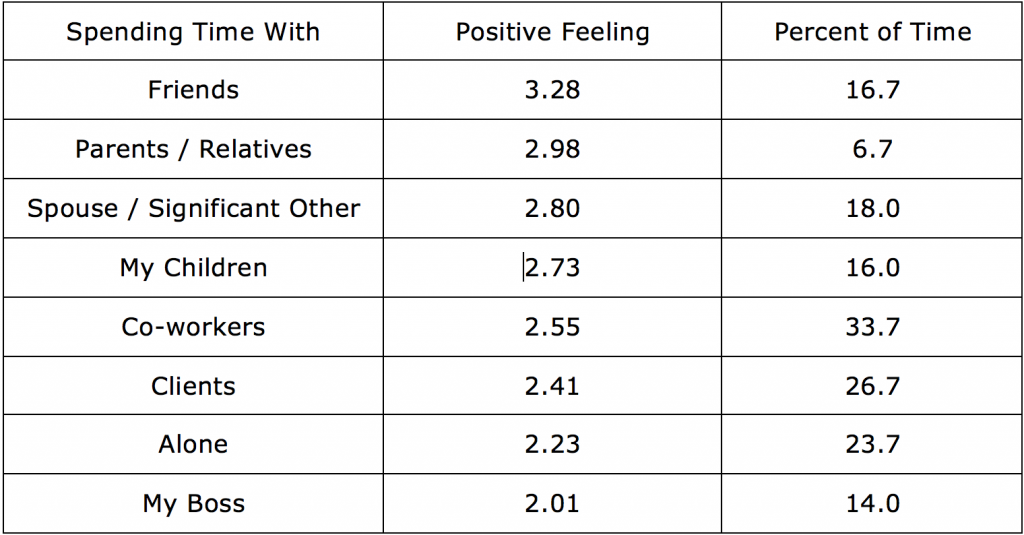23 Nov 2015 Two Ways to Measure Your Happiness: What Kahneman Taught Me

I was sitting at the Vancouver Airport having missed my standby connection by just 5 minutes, and now I had to wait another 5 hours for the “red-eye” flight I had booked originally. There was only one word to describe my state: miserable.
But was I really? I had 5 hours to reflect on that question, and so I decided to write this Willpower Post.
What is happiness? Is there just one kind, or several? Can we measure it? What really makes us happy anyway? And even if we knew the answer, would we use this knowledge to design our lives in a way that will make us happier?
Let’s try to unpack these questions.
The Science Of Happiness:
Daniel Kahneman is a renowned psychologist and Nobel Laureate, well known for his Ted Talk, “The Riddle of Experience VS Memory”. He defines two types of happiness:
-
Experiential Happiness.
This is the kind of happiness we experience at the moment when we just feel happy without even thinking about it. This is a more transient kind of happiness. And indeed, 5 minutes into my misery at Vancouver Airport, once I engaged fully in writing this post, I was no longer miserable at all. I was as happy as can be, and the words were just pouring out of my keyboard. Then I read about the horrible events in Paris on the evening of Friday, November 13th, and everything else paled into insignificance, including my misery and my happiness both.
-
Reflective Happiness.
This is the kind of happiness we think about when we reflect on our lives and ask ourselves: “Am I satisfied with my life?” What yardsticks would you use to answer this question? Money, career, health, family life, social life, a composite of them all?
Kahneman says that people spend much more time planning the actions that will help us meet our reflective happiness goals, not our experiential happiness. For example, most men plan their lives so that they can spend the most time at work, pursuing their career, even if that does not necessarily make them happier. And the reason does not have to do only with earning a living.
A friend of mine is soon to be 68 years of age. He has been successful in his career in a way that very few people do. He is also better off financially more than most people I know. He loves his grandchildren to no end. Every time we meet, he talks about how enjoyable his time with them is. And yet he spends most of his days on the road doing consulting work for companies located miles away from home.
Why is it that we spend more time planning and acting on our reflective happiness rather than on our experiential happiness? Kahneman does not explain the answer to this riddle.
Let’s look at what will make us happier at the moment.
Factors Affecting Our Happiness:
1. Spending Time With People We Love.
According to Kahneman, spending time with friends ranks at the top of the list of what makes people happier. We feel the most experiential happiness when we spend time with people whom we care about and we feel comfortable with. Most of us are not very happy about spending time alone. Only spending time with our boss ranks lower on the happiness scale. We should note, however, that the extent to which we are comfortable spending time with ourselves varies from person to person. Some cannot stand it, while others are completely comfortable with it.

“Most of us are not very happy spending time alone. Only spending time with our boss ranks lower in the happiness scale.”
2. Money and Happiness.
In his research, Kahneman found that earning less than $75,000 per year in the USA, makes people unhappy, both experientially and reflectively. It is not easy being poor, and it does make people feel miserable, moment-to-moment and when they reflect on their lives.
But making more than $75,000 per year does not make people happier experientially. Whether you make $100,000 or $150,000 will not make you experience a better happier life. It will, however, make you be more satisfied with your life when you reflect on it and recount your achievements.
It is important, however, that we consciously weigh the alternatives and consider the most desirable balance between the time we spend on our career and the time we spend doing things that make us experience happiness.
3. Sleep.
It turns out that there is a strong correlation between sleeping well and feeling happy. Conversely and not surprisingly, lack of sleep makes us cranky and unhappy. Some of us brag about the fact that “we do not need much sleep”. Scientists suggest that we need between 6.5 and 8 hours of sleep per night in order to fully cleanse the neurotoxins that accumulate in our brain during the day. The trouble is that the brain does not give us good warning signals when the cleansing process is not complete, and when chronic damage starts building up.
“Scientists suggest that we need between
6.5 and 8 hours of sleep per night in order to fully cleanse the neurotoxins that accumulate in our
brain during the day.”
4. Breakfast and Happiness.
Surprisingly breakfast with a good cup of coffee brings about a universal experience of happiness. Scientists have not discovered exactly why that is, but they do recommend that we consciously schedule our day so that we have enough time to enjoy our breakfast.
5. Doing Stuff You Love To Do.
Kahneman also found that immersing yourself in things you love to do, such as reading a good book, watching a good movie, playing a musical instrument, or engaging in an all-consuming hobby, make us feel experientially happier. But these activities do not necessarily make us be more satisfied with our lives. So it is really up to you as to whether you want to be happy or satisfied with your life.
6. Happiness and Age.
Another interesting finding is that we get happier as we progress in age, as long as we remain healthy and we have the financial means to lead the life we want to. So if you are under 40, you can look forward to a happier life in years to come.
Can We Cultivate The Skill of Happiness?
Can we train our brain to keep us happier? It turns out that we can, but like everything else in life it requires considerable time and commitment. Neuroscientists found that the left side of our Prefrontal Cortex (PFC), the thinking part of our brain, is responsible for our happiness and joy, whereas the right side of our PFC is responsible for our negative mood. Richard Davidson studied the brains of Tibetan monks who were long term meditators and compared them to the brains of non-meditators. Davidson found that the left PFC of long-time meditators is more densely connected than that of non-meditators, implying that mindfulness meditation can help us develop the happy side of our brain.
“Mindfulness meditation can help us develop the
happy side of our brain.”
Summary
In summary, happiness is a multi-dimensional quality of our life. It includes the happiness we feel moment-to-moment when we spend time with the people we love or do things we like to do. It also includes our reflective happiness, which we experience when we think about how satisfied we are with the way our life unfolded.
The challenge is not to allow “life to just happen to us”, but to design that kind of life which will bring about the ideal personal balance between our experiential happiness and our reflective one.
What are the things that make you happiest? Do you put more of a focus on your experiential or reflective happiness?
If you haven’t already, be sure to check out my previous post about when I ran the Toronto Scotiabank Waterfront Marathon and learned about the Three Ways to Break Through My Comfort Zone.



